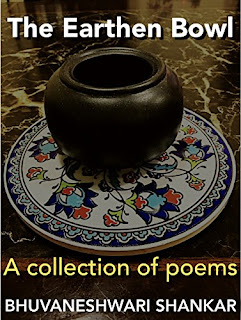The Earthen Bowl by Bhuvaneshwari Shankar
When one delves into the poetic offerings of Bhuvaneshwari Shankar, it is akin to dipping in a cornucopia of life itself, in all its myriad glories. As one reads through her poems, one is likely to find, as she herself suggests, a mirror to one’s feelings.
In ‘Beginnings’, one is reminded of Wordsworth’s “Child is Father of the Man”, especially in ‘Hold My Hand My Love’ where the mother and the daughter shift roles “as we walk together through life, /No, not all of the Seven Ages,/Just, till you think you are no more a child.” This ends on a poignant note as the daughter replies, “I will walk beside you mother,/I will hold your hand in mine /Not for you that clawing grasp, mother/ More a gentle but firm grasp.../ Until you cross the Seven Ages, /Until it’s Time to let go.”
Bhuvaneshwari writes of the world gone by, and of relationships that have strengthened over the years. She also reminisces about the loss of those times when “making origami boats... was magic” and of “baby mangoes in the wind”. In her poems, the world is not always a safe place as neighbours, trusted friends, “turn odiously brutal”. Her love and reverence for her father come through in the poem ‘Father – My Mentor’, to whom she dedicates her little success.
‘Don’t Glide into the Night, Gentle Knight’ has a lyrical, almost literary mood to it, reminiscent of Dylan Thomas’ ‘Do Not Go Gentle Into That Good Night’.
‘Creations’ is devoted to the poet’s “brushes with the divine” even as she waxes eloquent about ‘tinsel showers’ that hold “their place in skewered lines, rows of tiny pearl necklaces” and peacock feathers locked inside books by children. The poem ‘Bird Song’ glows in its literary luminescence, its queries echoing those in William Blake’s ‘The Tiger’. Bhuvaneshwari is quite the artist with words as she describes the divine process of creation by a cosmic botanist in ‘April’.
“Did he with his bare hands mould/Working with pipettes and burettes of gold/Dabbing, dripping, mixing, freeing/A drop, a tinge, a splash, a spray/Unleashing a springtime sight so gay?”
It is apparent that the rains are loved.
“The fragrance speaks its own language /It tells you it’s time to dance/ Time for paper boats/Time for holidays/Time for a joyful contagion.”
The poet treats Love with the dignity it deserves in the next section of the book, as she describes it as “a wraith/ fanning away at your bedewed forehead/a gentle breeze in a windowless room.”
‘After All the Goodbyes Have Been Said’ is a symphony of two hearts that “fear waking/to find that it was only a dream’. It strikes a balance between a minstrel song of the distant past and a casual conversation, where, “If he lags she pitches in, with a bad joke, even a miscue.” There is a melancholic beauty in ‘Sometimes as I Pass the Day’ as a lover muses over what his love is up to across the day.
The poet creates various forms of the poem such as the roseate sonnet in ‘Ras Leela’, pleasing Haikus, cinquains, quatrains and ghazals to add to her impressive repertoire.
‘For Women’ deals with the fortitude of women in different circumstances, as they strive to find their little moments of happiness, as “the spirit within hungers for action.” The poet talks of her yearning for “the flashes of creativity/That last for all of a second/Like a drop of rain that falls from above/ Only to be lost in the murk” even as “The pen dips once more/Into dark inky depths/Casts about for a pearl/To birth.”
‘A Bit of Fun’ reveals the mischievous side of the poet, as she talks of imbeciles becoming wise, the world’s obsession with size zero and bugs in one’s bed. ‘Mobile Phone’ shows the dangerous trend as family members live on, “each an island linked by a mobile phone”.
The final section, ‘Introspection’ finds the poet in a thoughtful mood as she muses over a vacant world, a vast wasteland, where love, “the spirit of the universe/ Withers, thaws and dies”. She herself is “an insignificant speck/In that vast void/Yet I dance, I scream, /My eyes rimmed/By the never ending waves”.
Bhuvaneshwari touches all aspects of life and love in her well-rounded collection of poems. Her earthen bowl is replete with offerings that reflect her core beliefs. As I sign off, the words of William Blake come to mind.
“To see a World in a Grain of Sand
And a Heaven in a Wild Flower
Hold Infinity in the palm of your hand
And Eternity in an hour.”





Thank you dear Deepti Menon for reading and reviewing my poetry collection. It is heartening to read your in depth discussion of my book. When an accomplished and eminent writer such as yourself reviews my book, it becomes that much more special. It is encouraging to read that you relished this collection and and I am enthused to write more <3
ReplyDeleteDear Bhuvana, you are such an accomplished writer and poet yourself. Here's to many more books and wonderful pieces of writing!
ReplyDelete